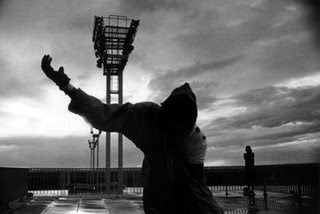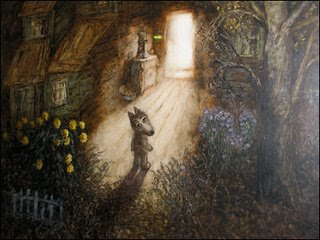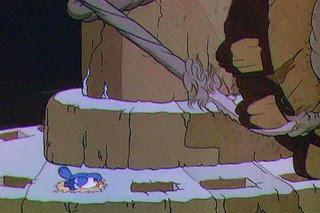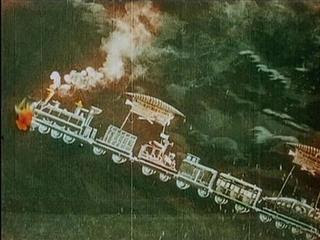USA, 7 min
Directed by: Friz Freleng
Written by: Michael Maltese (story)
Starring: Mel Blanc (voice), Arthur Q. Bryan (voice)
 When dim-witted Elmer Fudd gets his hands on a book about hypnotism, we just know that it won't take long for his plan to backfire… what we didn't anticipate, however, is that it would subsequently backfire again in his favour. The Hare-Brained Hypnotist (1942) was directed by Friz Freleng, and was released October 31, 1942. The cartoon is notable in that the animators have reverted back to the Elmer Fudd we're all accustomed to, after retiring the experimental rotund version that was last featured in Fresh Hare (1942). It is also interesting in that, unlike the majority of Bugs' encounters with Fudd, the humiliation isn't all one-way traffic, and the pair actually find their traditional comedic roles to have been reversed due to the influence of the powerful hypnotism. The film ends with arrogant Bugs as the fall-guy, having been duped into the belief that he is a Douglas XB-19 experimental bomber aircraft ("I'm the B-19!"), promptly due at the airport to make his flight.
When dim-witted Elmer Fudd gets his hands on a book about hypnotism, we just know that it won't take long for his plan to backfire… what we didn't anticipate, however, is that it would subsequently backfire again in his favour. The Hare-Brained Hypnotist (1942) was directed by Friz Freleng, and was released October 31, 1942. The cartoon is notable in that the animators have reverted back to the Elmer Fudd we're all accustomed to, after retiring the experimental rotund version that was last featured in Fresh Hare (1942). It is also interesting in that, unlike the majority of Bugs' encounters with Fudd, the humiliation isn't all one-way traffic, and the pair actually find their traditional comedic roles to have been reversed due to the influence of the powerful hypnotism. The film ends with arrogant Bugs as the fall-guy, having been duped into the belief that he is a Douglas XB-19 experimental bomber aircraft ("I'm the B-19!"), promptly due at the airport to make his flight.The characteristically-dim Fudd opens the cartoon on his usual hunting trip through the forest, though he's also found it necessary to read a new book at the same time. When he happens upon the secret to hypnotism, Fudd tests the technique on a ferocious bear, which is soon fluttering in the stratosphere with the presupposition of being a canary. Here, he decides, is his real opportunity to bamboozle the "pesky wabbit" once and for all. But, of course, Bugs proves himself to be more troublesome than his opponent had anticipated, and it isn't long before Fudd finds himself at the receiving end of a hypnotist's powerful glare. This is when director Friz Freleng turns the tables: after Fudd is ordered to act like a rabbit, he immediately hijacks Bugs' usual comedic niche, and the hapless rabbit, despite thinking himself the winner in this particular spate, is consistently out-witted by the stealthy wabbit known as Elmer Fudd. The cleverest Merrie Melodies are those that recognise the series' clichés and actively subvert them – The Hare-Brained Hypnotist does this very well.
7/10
 Walt Disney stated that his prime inspiration for creating Mickey Mouse was Chaplin's Tramp character. However, the Mickey seen in
Walt Disney stated that his prime inspiration for creating Mickey Mouse was Chaplin's Tramp character. However, the Mickey seen in  One can't critique a Stan Brakhage work the way one does an ordinary film. I'm not entirely convinced that the director had anything specific in mind when he created Night Music (1986), but, whatever he was going for, it was something subliminal. Though running for a mere thirty seconds (making this, I believe, the shortest film I've ever seen), the eye is greeted with dozens, perhaps even hundreds, of individual hand-painted images, each shimmering from the frame like searing patches of napalm. What Brakhage is showing us is unclear, but probably irrelevant – more important is what we actually see. Me? I saw the vastness of outer space, glittering with blazing nebulae of dust and flame. I saw a frantic oceanic battle, with ships floundering in the waves. I saw a village disappear in an explosion of fire. Then I watched Night Music again, and again, and saw something different every time. The human brain is a brilliant if peculiar interpretor of visual information, and Brakhage taps into the mind's inherent subjectivity. With this goal in mind, he produced a series of silent hand-painted short films, the most impressive of which is The Dante Quartet (1987), a six-minute adaptation of Dante's "The Divine Comedy."
One can't critique a Stan Brakhage work the way one does an ordinary film. I'm not entirely convinced that the director had anything specific in mind when he created Night Music (1986), but, whatever he was going for, it was something subliminal. Though running for a mere thirty seconds (making this, I believe, the shortest film I've ever seen), the eye is greeted with dozens, perhaps even hundreds, of individual hand-painted images, each shimmering from the frame like searing patches of napalm. What Brakhage is showing us is unclear, but probably irrelevant – more important is what we actually see. Me? I saw the vastness of outer space, glittering with blazing nebulae of dust and flame. I saw a frantic oceanic battle, with ships floundering in the waves. I saw a village disappear in an explosion of fire. Then I watched Night Music again, and again, and saw something different every time. The human brain is a brilliant if peculiar interpretor of visual information, and Brakhage taps into the mind's inherent subjectivity. With this goal in mind, he produced a series of silent hand-painted short films, the most impressive of which is The Dante Quartet (1987), a six-minute adaptation of Dante's "The Divine Comedy."




_poster.jpg)

